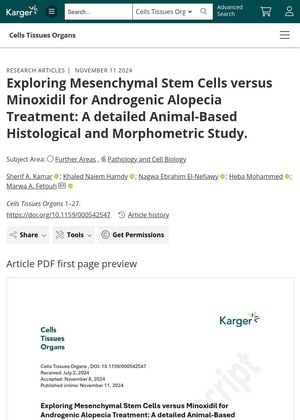TLDR Stem cells from umbilical cord blood are more effective than minoxidil for treating hair loss.
This study compared the effectiveness of human umbilical cord blood-derived mesenchymal stem cells (HUCB-MSCs) and minoxidil in treating androgenic alopecia (AGA) using 48 adult male Wistar albino rats. The rats were divided into four groups: a control group, an AGA group, an AGA group treated with minoxidil, and an AGA group treated with HUCB-MSCs. Results showed that HUCB-MSCs significantly reversed hair and follicle damage, enhanced the anagen phase, and reduced hair loss more effectively than minoxidil. The stem cell treatment led to dense and long hair growth without side effects, suggesting it as a promising alternative for AGA treatment.
 August 2023 in “Journal of Cosmetic Dermatology”
August 2023 in “Journal of Cosmetic Dermatology” Some plants like spinach, broccoli, and matcha may boost the effectiveness of the hair growth drug minoxidil.
 8 citations
,
April 2019 in “Dermatologic Therapy”
8 citations
,
April 2019 in “Dermatologic Therapy” Tretinoin boosts minoxidil's effect on hair loss by increasing enzyme activity.
5 citations
,
January 2018 in “Italian journal of dermatology and venereology” Minoxidil effectively stimulates hair growth in androgenetic alopecia.
 397 citations
,
February 2004 in “British Journal of Dermatology”
397 citations
,
February 2004 in “British Journal of Dermatology” Minoxidil boosts hair growth by opening potassium channels and increasing cell activity.
January 2003 in “Journal of Clinical Dermatology” TNF-${\alpha}$ slows hair growth, and minoxidil doesn't help.
 269 citations
,
August 2002 in “Journal of The American Academy of Dermatology”
269 citations
,
August 2002 in “Journal of The American Academy of Dermatology” 5% minoxidil works better for hair growth and density, with minor irritation.
 15 citations
,
April 2001 in “Journal of Dermatological Science”
15 citations
,
April 2001 in “Journal of Dermatological Science” KF19418 promotes hair growth similarly to minoxidil but is not better in live mice.
March 1990 in “Journal of Dermatological Science”  39 citations
,
March 1987 in “Journal of The American Academy of Dermatology”
39 citations
,
March 1987 in “Journal of The American Academy of Dermatology” Topical minoxidil is a safe and effective treatment for hair loss caused by androgenetic alopecia.







